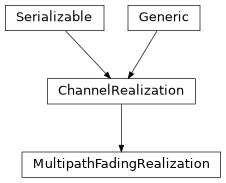Multipath Fading Realization¶

- class MultipathFadingRealization(random_realization, antenna_correlation_variable, los_angles_variable, nlos_angles_variable, los_phases_variable, nlos_phases_variable, power_profile, delay_profile, los_gains, nlos_gains, los_doppler, nlos_doppler, antenna_correlation, sample_hooks, gain)[source]¶
Bases:
ChannelRealization[MultipathFadingSample]Realization of a statistical multipath fading channel.
Generated by the
realize()routine of aMultipathFadingChannel.- Parameters:
sample_hooks (
Set[ChannelSampleHook[MultipathFadingSample]]) – Hooks to be called after the channel is sampled.gain (
float) – Linear power gain factor a signal experiences when being propagated over this realization. \(1.0\) by default, meaning no gain or loss.
- classmethod Deserialize(process)[source]¶
Deserialize an object’s state.
Objects cannot be deserialized directly, instead a
Factorymust be instructed to carry out the deserialization process.- Parameters:
process (
DeserializationProcess) – The current stage of the deserialization process. This object is generated by theFactoryand provides an interface to deserialization methods supporting multiple backends.- Return type:
- Returns:
The deserialized object.
- serialize(process)[source]¶
Serialize this object’s state.
Objects cannot be serialized directly, instead a
Factorymust be instructed to carry out the serialization process.- Parameters:
process (
SerializationProcess) – The current stage of the serialization process. This object is generated by theFactoryand provides an interface to serialization methods supporting multiple backends.- Return type: